In the first part of Mahabharata we read that Ganga flew away with Shantanu's child. Now let us learn what happened next !
Many years later, when Shantanu visited the river Ganga, Goddess Ganga emerged out of the river with a young boy.
She said, "Oh King ! Here is your eighth son, Devavrata. He has mastered the art of weilding arms, and has unparalleled skills, equalling those of Sage Parshuram. Rushi Vasishtha has imparted the knowledge of the Vedas and the Vedanta, arts and sciences to him. This is your child, the finest archer and master statesman. He will bring immortal fame to his father’s name, and will be a great boon to the future generation. I have brought him up in order to let him cope with the life on this earth”. (Ganga, as an ideal parent, ensured that their child would be brought up with the right sanskars. This was necessary so as to mould young Devavrata for his future role as a mentor to the descendents of Shantanu)
King Shantanu was very happy to receive his son and with great pride he brought the prince to the palace. While celebrating Devavrata’s arrival the king declared him the crown prince of his kingdom. Devavrata was brave, just and looked highly promising. The subjects welcomed the decision wholeheartedly.
King Shantanu was getting old and so he decided to step down from his throne. He was lonely and always missed his wife Ganga. One day while he was taking a stroll on the bank of the river Ganga, he was attracted towards a charming maiden, Satyavati. She was the daughter of the chief of the fishermen tribe. She used to ferry rushis across the river, in her boat. She had a Divine fragrance coming out of her body.
Satyavati did not always have such a divine fragrance. She was originally known as Matsyagandha due to the fishy smell that emanated from her. Once Rushi Parashar came to the riverbank and asked to be ferried across. That time Satyavati took him across the river in her boat. Rushi Parashar was pleased with her and blessed her with a divine fragrance along with the boon of a son who was named Vyas. Immediately after his birth, Vyas grew up quickly through his Divine powers and left to meditate. Vyas, however, promised his mother Satyavati that he will always be at her beck and call. (Vyas, is the legendary sage Ved Vyas, who had mastered the Vedas, the first Guru. Ved Vyas narrated the entire Mahabharata at a stretch while Shri Ganesh wrote it down. Sage Vyas was also a mentor to the descendents of Shantanu)
Shantanu did not know anything about Satyavati’s past. He was charmed by her beauty. He went to her father, the fisherman chief, and asked for Satyavati's hand in marriage. The chief agreed to the proposal but laid down a condition. He told the king that the son born to Satyavati should be the successor of to King and not Devavrata. Shantanu was shocked to hear the condition and returned home disappointed and unhappy. Devavrata later discovered the cause of his father's unhappiness and went to Satyavati's father and requested him to allow his father, king Shantanu to marry Satyavati. In return he promised to give up his right to the throne for Satyavati's son.
Satyavati's father thought for a while and said, "We believe noble prince, but what about your children? What if they covet the throne?"
Hearing this, Devavrata took the grave vow that he will never marry in his life, for he would remain celibate. From then on he was known as Bhishma, the firm. Bhishma respectfully brought Satyavati to Shantanu's palace. Shantanu was elated to see Satyavati but was shocked when he heard about Bhishma's vow. He blessed Bhishma with the power to choose his time of death (Ichchha mrutyu).
In due course, queen Satyavati became the mother of two princes – Chitrangad and Vichitravirya. After Shantanu's death, Chitrangad succeeded the throne but was killed in a war. Vichitravirya, then a minor, was crowned by Bhishma as the king of Hastinapur. When Vichitravirya came of age, Bhishma and queen Satyavati got him married to two princesses of the king of Kashi, Ambika and Ambalika. Unfortunately, Vichitravirya died without a successor.
Bhishma and Satyavati decided to call Ved Vyas. Vyas arrived in no time. Satyavati explained to him the grave situation that the family had no heir. She requested Vyas to bless Ambika, the elder of the two widows of Vichitravirya, with a son who can succeed the deceased king. Vyas agreed.
Vyas asked Ambika to come to him, but she was terrified of Him and closed her eyes when she was near Vyas. The Sage blessed her with a son. But since she had closed her eyes, the son born to Ambika was blind. He was named Dhritarashtra. The queen was disappointed and asked Vyas to bless Ambalika, the younger widow. Ambalika had one look at Sage Vyas and turned pale out of fear while the Sage was uttering the boon. As a result, the child born to Ambalika was pale and was called Pandu, meaning pale.
Queen Satyavati was puzzled, what can be done now? She requested Sage Vyas for another chance and sent for Ambika to receive the boon again. Ambika did not wish to go before the Sage. Instead, without telling her mother-in-law, Ambika sent her maid to the Sage after disguising her with stately garments. The maid remained fearless and greeted Ved Vyas with great devotion. Feeling happy, the Sage gave her a boon and she bore a perfect child called Vidur.
In course of time Pandu ascended the throne as his elder brother Dhrutarashtra was blind and Vidur became the prime minister due to his ability of perfect judgement and distinguished talent. Dhrutarashtra married Gandhari, the princess of Gandhar in Baluchistan. When Gandhari came to know that her husband is blind, she bandaged her eyes permanently with a cloth.
During the time of Pandu, the Kuru kingdom expanded far and wide. Pandu was married twice, first to Kunti and then to Madri. After many years of rule, Pandu decided to retire to Himalayas leaving the kingdom in the hands of Dhrutarashtra and grandfather Bhishma. There was no heir to the throne since none of the brothers had any children. So what happened thereafter?
Dear children, Bhishma took such a grave oath for his father. Our parents do not ask for such sacrifices from us. We are sometimes asked to do minor things like helping to clean the house, doing our homework on time or even just spending some time with them. Bhishma’s story reminds us that we too have a duty towards our parents. Will you promise to love and respect your parents and always try to keep them happy ?
Click here to read part three !

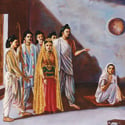 Arjuna’s exile
Arjuna’s exile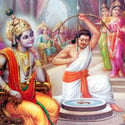 Draupadi Swayamvar
Draupadi Swayamvar Escape from lakshagriha !
Escape from lakshagriha !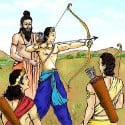 The Princes grow up!
The Princes grow up!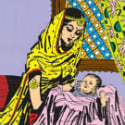 Birth of Pandavas and Kauravas
Birth of Pandavas and Kauravas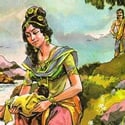 Shantanu and Ganga’s wedding
Shantanu and Ganga’s wedding